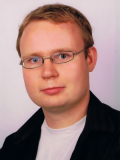Mariusz Ostrowski, PhD
E-mail: mariusz.ostrowski@pwr.edu.pl
Unit: Faculty of Electronics, Photonics and Microsystems (N) » Department of Electronic and Photonic Metrology
 ul. B. Prusa 53/55, 50-317 Wrocław
ul. B. Prusa 53/55, 50-317 Wrocław
building E-1, room 110
phone +48 71 320 6309
Office hours
- Wednesday 11.00-13.00
- Thursday 11.00-13.00
Research fields
- Renevable energy sources; electronics of renevable energy sources; computer programming using C/C++, JAVA or PHP languages; operating systems.
Recent papers
2016
- Ostrowski M.M., A hybrid solar panel maximum power point search method that uses light and temperature sensors. W: Photonics for Solar Energy Systems VI / Ralf B. Wehrspohn, Andreas Gombert, Alexander N. Sprafke (eds.). Bellingham, Wash.: SPIE, cop. 2016. art. 98980X, s. 1-7 (SPIE Proceedings Series, ISSN 0277-786X; vol. 9898).
- Mroczka J., Ostrowski M.M., A hybrid solar panel maximum power point search method that uses light and temperature sensors in real shading conditions. Renewable Energy & Power Quality Journal [Dokument elektroniczny]. 2016, nr 14, s. 392-396.
2015
- Mroczka J., Ostrowski M.M., Maximum power point search method for photovoltaic panels which uses a light sensor in the conditions of real shading and temperature. W: Modeling Aspects in Optical Metrology V, 23-25 June 2015 Munich, Germany / Bernd Bodermann, Karsten Frenner, Richard M. Silver (eds.). Bellingham, Wash.: SPIE, cop. 2015. art. 95261L, s. 1-8 (SPIE Proceedings Series, ISSN 0277-786X; vol. 9526).
- Ostrowski M.M., Photovoltaic maximum power point search method using a light sensor. W: Integrated Optics: Physics and Simulations II / Pavel Cheben, Jiří Čtyroký, Inigo Molina-Fernández (eds.). Bellingham, Wash.: SPIE, cop. 2015. art. 95160D, s. 1-8 (SPIE Proceedings Series, ISSN 0277-786X; vol. 9516).
2014
- Mroczka J., Ostrowski M.M., A hybrid maximum power point search method using temperature measurements in partial shading conditions. Metrology and Measurement Systems. 2014, vol. 21, nr 4, s. 733-740.
| Selected publications | |||||
|---|---|---|---|---|---|
| 1 | Artykuł 2024
| ||||
| 2 | Artykuł 2023
| ||||
| 3 | Artykuł 2023
| ||||
| 4 | Referat konferencyjny 2019
| ||||
| 5 | Referat konferencyjny 2019
| ||||
| 6 | Referat konferencyjny 2019
| ||||
| 7 | Referat konferencyjny 2018
| ||||
| 8 | Referat konferencyjny 2018
| ||||
| 9 | Referat konferencyjny 2018
| ||||
| 10 | Artykuł 2016
| ||||

